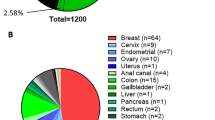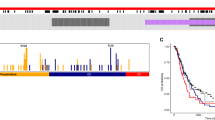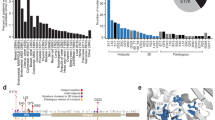Abstract
Activation of the phosphoinositide 3-kinase (PI3K) pathway occurs widely in human cancers. Although somatic mutations in the PI3K pathway genes PIK3CA and PTEN are known to drive PI3K pathway activation and cancer growth, the significance of somatic mutations in other PI3K pathway genes is less clear. Here, we establish the signaling and oncogenic properties of a recurrent somatic mutation in the PI3K p110β isoform that resides within its kinase domain (PIK3CβD1067V). We initially observed PIK3CβD1067V by exome sequencing analysis of an EGFR-mutant non-small cell lung cancer (NSCLC) tumor biopsy from a patient with acquired erlotinib resistance. On the basis of this finding, we hypothesized that PIK3CβD1067V might function as a novel tumor-promoting genetic alteration, and potentially an oncogene, in certain cancers. Consistent with this hypothesis, analysis of additional tumor exome data sets revealed the presence of PIK3CβD1067V at low frequency in other patient tumor samples (including renal cell carcinoma, glioblastoma multiforme, head and neck squamous cell carcinoma, melanoma, thyroid carcinoma and endometrial carcinoma). Functional studies revealed that PIK3CβD1067V promoted PI3K pathway signaling, enhanced cell growth in vitro, and was sufficient for tumor formation in vivo. Pharmacologic inhibition of PIK3Cβ with TGX-221 (isoform-selective p110β inhibitor) specifically suppressed growth in patient-derived renal-cell carcinoma cells with endogenous PIK3CβD1067V and in NIH-3T3 and human EGFR-mutant lung adenocarcinoma cells engineered to express this mutant PI3K. In the EGFR-mutant lung adenocarcinoma cells, expression of PIK3CβD1067V also promoted erlotinib resistance. Our data establish a novel oncogenic form of PI3K, revealing the signaling and oncogenic properties of PIK3CβD1067V and its potential therapeutic relevance in cancer. Our findings provide new insight into the genetic mechanisms underlying PI3K pathway activation in human tumors and indicate that PIK3CβD1067V is a rational therapeutic target in certain cancers.
This is a preview of subscription content, access via your institution
Access options
Subscribe to this journal
Receive 50 print issues and online access
$259.00 per year
only $5.18 per issue
Buy this article
- Purchase on Springer Link
- Instant access to full article PDF
Prices may be subject to local taxes which are calculated during checkout




Similar content being viewed by others
References
Porta C, Paglino C, Mosca A . Targeting PI3K/Akt/mTOR signaling in cancer. Front Oncol 2014; 4: 64.
Engelman JA, Luo J, Cantley LC . The evolution of phosphatidylinositol 3-kinases as regulators of growth and metabolism. Nat Rev Genet 2006; 7: 606–619.
Chalhoub N, Baker SJ . PTEN and the PI3-kinase pathway in cancer. Annu Rev Pathol 2009; 4: 127–150.
Bauer TM, Patel MR, Infante JR . Targeting PI3 kinase in cancer. Pharmacol Ther 2015; 146C: 53–60.
Samuels Y, Wang Z, Bardelli A, Silliman N, Ptak J, Szabo S et al. High frequency of mutations of the PIK3CA gene in human cancers. Science 2004; 304: 554.
Vogt PK, Kang S, Elsliger MA, Gymnopoulos M . Cancer-specific mutations in phosphatidylinositol 3-kinase. Trends Biochem Sci 2007; 32: 342–349.
Kang S, Bader AG, Vogt PK . Phosphatidylinositol 3-kinase mutations identified in human cancer are oncogenic. Proc Natl Acad Sci USA 2005; 102: 802–807.
Janku F, Tsimberidou AM, Garrido-Laguna I, Wang X, Luthra R, Hong DS et al. PIK3CA mutations in patients with advanced cancers treated with PI3K/AKT/mTOR axis inhibitors. Mol Cancer Ther 2011; 10: 558–565.
Karakas B, Bachman KE, Park BH . Mutation of the PIK3CA oncogene in human cancers. Br J Cancer 2006; 94: 455–459.
Hollander MC, Blumenthal GM, Dennis PA . PTEN loss in the continuum of common cancers, rare syndromes and mouse models. Nat Rev Cancer 2011; 11: 289–301.
Carracedo A, Pandolfi PP . The PTEN-PI3K pathway: of feedbacks and cross-talks. Oncogene 2008; 27: 5527–5541.
Wu JY, Yu CJ, Chang YC, Yang CH, Shih JY, Yang PC . Effectiveness of tyrosine kinase inhibitors on "uncommon" epidermal growth factor receptor mutations of unknown clinical significance in non-small cell lung cancer. Clin Cancer Res 2011; 17: 3812–3821.
Kosaka T, Yamaki E, Mogi A, Kuwano H . Mechanisms of resistance to EGFR TKIs and development of a new generation of drugs in non-small-cell lung cancer. J Biomed Biotechnol 2011; 2011: 165214.
Oxnard GR, Arcila ME, Chmielecki J, Ladanyi M, Miller VA, Pao W . New strategies in overcoming acquired resistance to epidermal growth factor receptor tyrosine kinase inhibitors in lung cancer. Clin Cancer Res 2011; 17: 5530–5537.
Tang J, Salama R, Gadgeel SM, Sarkar FH, Ahmad A . Erlotinib resistance in lung cancer: current progress and future perspectives. Front Pharmacol 2013; 4: 15.
Schroeder MP, Gonzalez-Perez A, Lopez-Bigas N . Visualizing multidimensional cancer genomics data. Genome Med 2013; 5: 9.
Deuker MM, Durban VM, Phillips WA, McMahon M . PI3'-kinase inhibition forestalls the onset of MEK1/2 inhibitor resistance in BRAF-mutated melanoma. Cancer Discov 2014; 5: 143–153.
Charles RP, Silva J, Iezza G, Phillips WA, McMahon M . Activating BRAF and PIK3CA mutations cooperate to promote anaplastic thyroid carcinogenesis. Mol Cancer Res 2014; 12: 979–986.
Jia S, Liu Z, Zhang S, Liu P, Zhang L, Lee SH et al. Essential roles of PI(3)K-p110beta in cell growth, metabolism and tumorigenesis. Nature 2008; 454: 776–779.
Jackson SP, Schoenwaelder SM, Goncalves I, Nesbitt WS, Yap CL, Wright CE et al. PI 3-kinase p110beta: a new target for antithrombotic therapy. Nat Med 2005; 11: 507–514.
Burger MT, Pecchi S, Wagman A, Ni ZJ, Knapp M, Hendrickson T et al. Identification of NVP-BKM120 as a potent, selective, orally bioavailable class I PI3 kinase inhibitor for treating cancer. ACS Med Chem Lett 2011; 2: 774–779.
Ling YH, Lin R, Perez-Soler R . Erlotinib induces mitochondrial-mediated apoptosis in human H3255 non-small-cell lung cancer cells with epidermal growth factor receptorL858R mutation through mitochondrial oxidative phosphorylation-dependent activation of BAX and BAK. Mol Pharmacol 2008; 74: 793–806.
Sos ML, Koker M, Weir BA, Heynck S, Rabinovsky R, Zander T et al. PTEN loss contributes to erlotinib resistance in EGFR-mutant lung cancer by activation of Akt and EGFR. Cancer Res 2009; 69: 3256–3261.
Lammers PE, Lovly CM, Horn L . A patient with metastatic lung adenocarcinoma harboring concurrent EGFR L858R, EGFR germline T790M, and PIK3CA mutations: the challenge of interpreting results of comprehensive mutational testing in lung cancer. J Natl Compr Canc Netw 2014; 12: 6–11.
Dbouk HA, Khalil BD, Wu H, Shymanets A, Nurnberg B, Backer JM . Characterization of a tumor-associated activating mutation of the p110beta PI 3-kinase. PloS One 2013; 8: e63833.
Lin L, Asthana S, Chan E, Bandyopadhyay S, Martins MM, Olivas V et al. Mapping the molecular determinants of BRAF oncogene dependence in human lung cancer. Proc Natl Acad Sci USA 2014; 111: E748–E757.
Boehm JS, Zhao JJ, Yao J, Kim SY, Firestein R, Dunn IF et al. Integrative genomic approaches identify IKBKE as a breast cancer oncogene. Cell 2007; 129: 1065–1079.
Acknowledgements
We acknowledge funding support (to TGB) from the following sources: NIH Director's New Innovator Award, Howard Hughes Medical Institute, Doris Duke Charitable Foundation, American Lung Association, National Lung Cancer Partnership, Sidney Kimmel Foundation for Cancer Research and Searle Scholars Program.
Author Contributions
EP designed, conducted and analyzed all experiments; PG, JSJ, MAG, JW, WP and TGB analyzed the patient tumor sequencing data; GH conducted shRNA knockdown experiments; VRO conducted tumor xenografts; RB provided patient tumor samples; TGB designed and analyzed the experiments; EP and TGB wrote the manuscript with input from all authors.
Author information
Authors and Affiliations
Corresponding author
Ethics declarations
Competing interests
TGB is a consultant to Driver Group, Novartis, Clovis Oncology and Cleave Biosciences, and has received a research grant from Servier; JW is a consultant to Driver Group; PG, JSJ and WP are employees of Driver Group. The remaining authors declare no conflict of interest.
Additional information
Supplementary Information accompanies this paper on the Oncogene website
Supplementary information
Rights and permissions
About this article
Cite this article
Pazarentzos, E., Giannikopoulos, P., Hrustanovic, G. et al. Oncogenic activation of the PI3-kinase p110β isoform via the tumor-derived PIK3CβD1067V kinase domain mutation. Oncogene 35, 1198–1205 (2016). https://doi.org/10.1038/onc.2015.173
Received:
Revised:
Accepted:
Published:
Issue Date:
DOI: https://doi.org/10.1038/onc.2015.173
This article is cited by
-
SUMOylation modulates the stability and function of PI3K-p110β
Cellular and Molecular Life Sciences (2021)
-
Targeting PI3K in cancer: mechanisms and advances in clinical trials
Molecular Cancer (2019)
-
Functional characterization of a novel somatic oncogenic mutation of PIK3CB
Signal Transduction and Targeted Therapy (2017)
-
PDK1 promotes tumor growth and metastasis in a spontaneous breast cancer model
Oncogene (2016)
-
Molecules in medicine mini-review: isoforms of PI3K in biology and disease
Journal of Molecular Medicine (2016)



